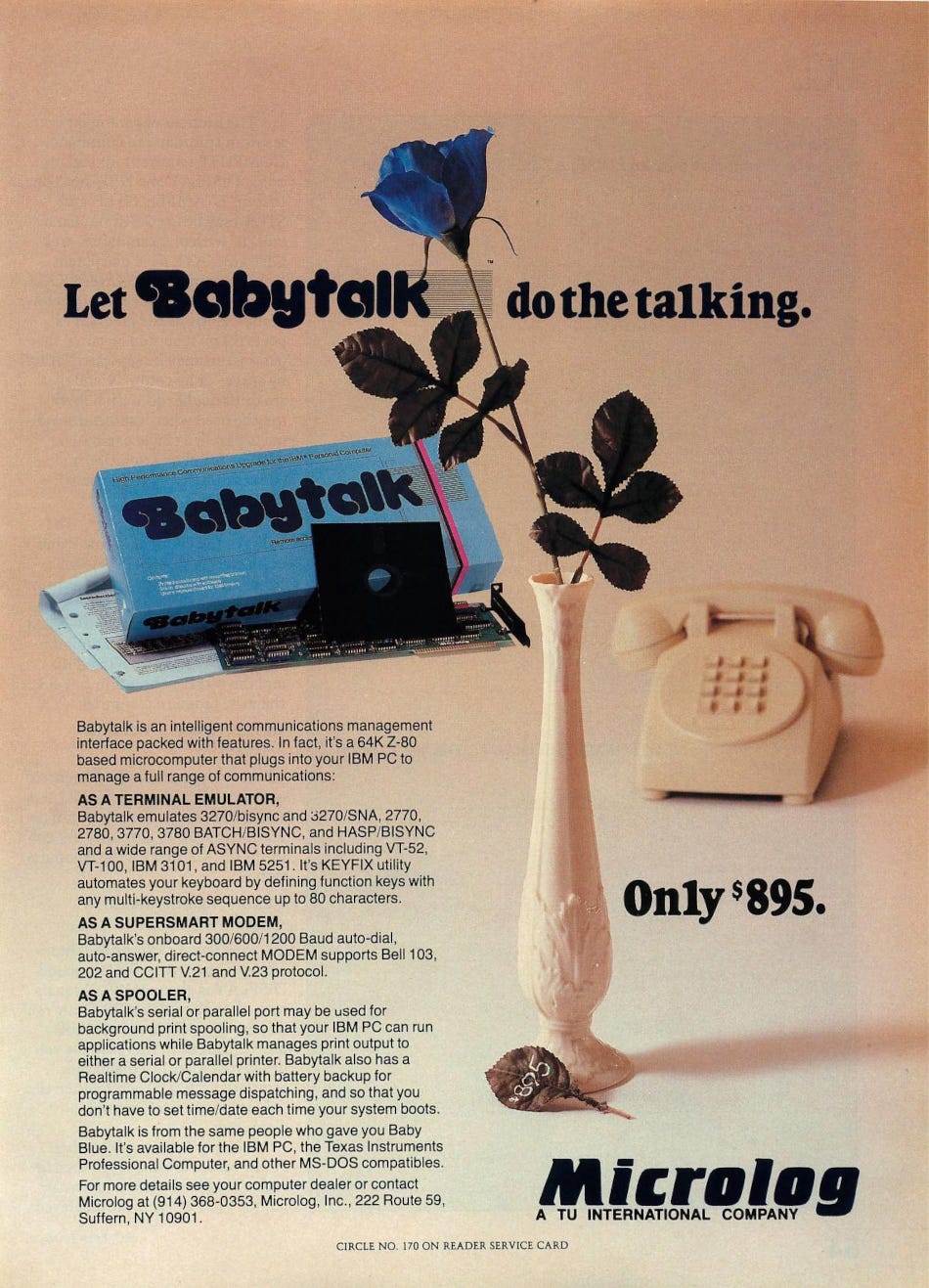The Company
Microlog was founded on June 1, 1982. At some point, Microlog became a subsidiary of Terminal Unlimited (or TU) International. TU International filed for bankruptcy in late 1985. According to a Washington Post article on the topic, TU went through 4 CEOs in a year. The article also states that TU owed "several millions of dollars" to creditors. In fact, the company’s bankruptcy lawyer said that TU was unable to meet its payroll.
The Hardware
The earliest mention of the Microlog Babytalk that I would find was in the September 26, 1983 issue of Computerworld:
Multifunction Board Fits IBM, TI Micros
Microlog, Inc., a subsidiary of Terminal Unlimited International, Inc., has unveiled a processor-controlled communications upgrade for the IBM and Texas Instruments, Inc. personal computers.
Babytalk, which also fits other brands of bus-compatible computers, is a multifunction board described by Microlog as capable of handling communications and data management tasks as background operations while the host processor performs foreground functions.
Babytalk is priced at $895 from Microlog at 222 Rt. 59, Suffern, N.Y. 10901.
The add-on was mentioned in the “What’s News?” section of December 1983 Byte Magazine.
Communications Manager Is Z80 Computer
Babytalk is an intelligent communications-management interface for the IBM PC and Texas Instruments Professional Computer. Babytalk. produced by Microlog, is a self-contained Z80-based micro-computer that provides a terminal emulator, a smart modem, a print spooler, 64K bytes of dynamic RAM, CP/M-80 compatibility, and automatic time/date. It emulates such protocols as 3270 bisync and 3270 SNA, and 3780 batch/bisync as well as a variety of asynchronous terminals, including DEC VT-100 and IBM 3101. Its on-board modem offers 300-, 600-, and 1200-bps operation and auto-dial and auto-answer. This direct-connect modem supports Bell 103/202 and CCITT V.21/V.23 protocols, For print spooling, Babytalk has both serial and parallel ports. Other features include a utility that lets you define function keys with multistroke sequences up to 80 characters long.
Babytalk costs $895.
PC Magazine also mentioned the new product in early 1984:
A Z-80 microprocessor-based multifunction board capable of handling complex communications and data management tasks as background operations, freeing the user's system for concurrent use in other applications. Dual-ported, 64K RAM on the board is accessible to both the board's Z80 processor and the host system’s 8088 processor. The board's basic configuration includes such features as CP/M-80 software compatibility (permitting the user to run CP/M-80 programs), print spooling, and an on-board 300/600/1200 baud modem. The modem has auto-dial/auto-answer capabilities, and is compatible with Bell 103, 202, and CCITT V.21 and V.23 protocols. Software utilities included with the basic board include a battery-backed clock/calendar, and Keyfix, for redefining function keys.
Software options available permit the board to emulate terminals from a range of manufacturers, and to support asynchronous and bisynchronous communications via Bisync 3270, SNA 3270, 2780/3780, HASP, and TTY protocols. Also available as an option is a smart modem emulator package, and a package for accessing Telex/TWX via Western Union’s EASYLINK network.
(List Price: Basic Package $895)
Finally, Mini-Micro Systems mentioned it in April of the same year.
I was unable to find any reviews of the product.
Have you ever used a Babytalk card? Do you know anything about its history? Tell us about it in the comments below.
What computer ads would you like to see in the future? Please comment below. If you enjoyed it, please share it with your friends and relatives. Thank you.


